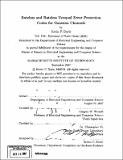Rateless and rateless unequal error protection codes for Gaussian channels
Author(s)
Boyle, Kevin P. (Kevin Patrick)
DownloadFull printable version (7.365Mb)
Alternative title
Rateless and RUEP codes for Gaussian channels
Other Contributors
Massachusetts Institute of Technology. Dept. of Electrical Engineering and Computer Science.
Advisor
Gregory W. Wornell and Christopher Yu.
Terms of use
Metadata
Show full item recordAbstract
In this thesis we examine two different rateless codes and create a rateless unequal error protection code, all for the additive white Gaussian noise (AWGN) channel. The two rateless codes are examined through both analysis and simulation with the hope of developing a better understanding of how the codes will perform and pushing the codes further toward implementation. After analyzing and simulating the rateless codes by themselves, we compare using a rateless code to two different forms of hybrid automatic repeat request (HARQ), namely Chase combining HARQ and incremental redundancy HARQ. We find that the rateless codes compare favorably to both forms of HARQ. In addition, we develop a code that has both rateless and unequal error protection (UEP) properties. A rateless code adapts to the quality of the channel and achieves capacity but all of the information bits are decoded at the same time and thus the bitstream cannot be prioritized. In addition, if only a finite number of retransmissions is allowed, the range of available rates that a rateless code can provide is limited. In contrast, a UEP code provides a prioritization of the bitstream, and an arbitrary range of rates but does not achieve capacity. The rateless UEP code, or RUEP code for short, provides the prioritization of a bitstream that UEP provides, and also adapts to the quality of the channel as a rateless code does. The RUEP code provides bitstream prioritization while being more efficient than a traditional UEP code and is capacity achieving for some channel realizations. In addition, the RUEP code provides a larger range of available rates than a rateless code when only a finite number of retransmissions is allowed.
Description
Thesis (S.M.)--Massachusetts Institute of Technology, Dept. of Electrical Engineering and Computer Science, 2007. Includes bibliographical references (p. 141-143).
Date issued
2007Department
Massachusetts Institute of Technology. Department of Electrical Engineering and Computer SciencePublisher
Massachusetts Institute of Technology
Keywords
Electrical Engineering and Computer Science.